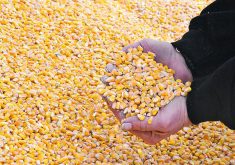It’s hard to be taken seriously in any debate if, geographically, you are located on the “Left Coast,” have elected a person known nationally as Governor Moonbeam (Jerry Brown) to statewide office five times and are home to a movie-making industry built on fantasy that’s centered in an area referred to as “LaLa Land.”
And, yet, California is ground zero in the hottest, most expensive farm fight in the nation this year. The match that lit this fire is a statewide ballot proposal known as Proposition 37 or, more simply, Prop 37, “a mandatory labelling of genetically engineered food initiative,” according to state referendum literature.
Read Also

Proactive approach best bet with looming catastrophes
The Pan-Canadian Action Plan on African swine fever has been developed to avoid the worst case scenario — a total loss ofmarket access.
If it passes in the Nov. 6 general election, Prop 37 will require “labelling on raw or processed food offered for sale to consumers if the food is made from plants or animals with genetic material changed in specific ways.”
Prop 37 also “prohibits labelling or advertising such food as ‘natural.’ ”
The proposal contains exemptions. One is food already labelled under the U.S. Department of Agriculture’s Certified Organic Program. Other, bigger exemptions include meat, most milk, alcoholic beverages, and food served in restaurants.
On the surface, the proposed labelling law, despite its exemptions, is about transparency: consumers having more knowledge of what they eat before they eat it. Simple, right?
Not in LaLa Left Coast Moonbeam Land.
Before the state even printed Prop 37 material, debate over it escalated from a Birkenstock throw-down at the local supermarket to a multimillion-dollar anti-GMO/pro-GMO war. Farmers were soon drawn into the fight by Big Agbiz.
For example, Cargill chair Greg Page sent a Sept. 11 letter to his company’s “Dear Valued Farmer Customer(s)” to ask them to join “Cargill and others” to “defeat Proposition 37.”
Page noted that “Cargill will match your contribution dollar for dollar up to $1,000 per farm” in opposing “a policy that stands to radically reshape our modern food system.”
Radically reshape or not, the Prop 37 fight is one rich brawl: money is pouring into California, mostly from agribusiness, to move voters in the anti-labelling direction.
By mid-October, labelling foes had collected $33.5 million. The big checks came from big genetically modified seed and biotech sellers: Monsanto, $7.1 million; E.I. DuPont (Pioneer’s parent), $4.9 million; Dow, Bayer, BASF and Syngenta, $2 million each.
Pro-labelling foodies, who had tossed $5.5 million into a recyclable canvas grocery bag, were badly overmatched.
Two weeks from voting, the Big Agbiz money began to bite. In September, polling by the Los Angeles Times indicated that Prop 37 was sailing to a two-to-one victory. A month later, however, the gap had shrunk to 48-40 percent with 11 percent undecided. Most pollsters see the vote narrowing as election day approaches.
If voters follow their consumer instinct, however, Prop 37 will pass. Every broad-based poll for decades has overwhelmingly favoured more food labelling over less.
If the simple idea of transparency becomes paramount, California will implement GMO labeling by 2014. Before then, though, other states will likely seek to implement similar, if not tougher, clearer, food labeling laws.
Farmers and ranchers, of course, will be poked and pushed by their input suppliers and production buyers to fight the labelling wave anywhere it breaks as an expensive and elitist effort that will foster lower farm prices, lower ag income and, sooner than later, global starvation.
But more than 40 nations, including Japan, China and all of Europe, already have similar label laws and not one has seen the sky fall and starvation rise.
As such, Prop 37, win or lose, isn’t the end of a LaLa Land fantasy; it’s just the beginning of your new reality. Your customers overwhelmingly favour transparency and they will, sooner or later, get it.
Guebert is a farm columnist from the United States.

















